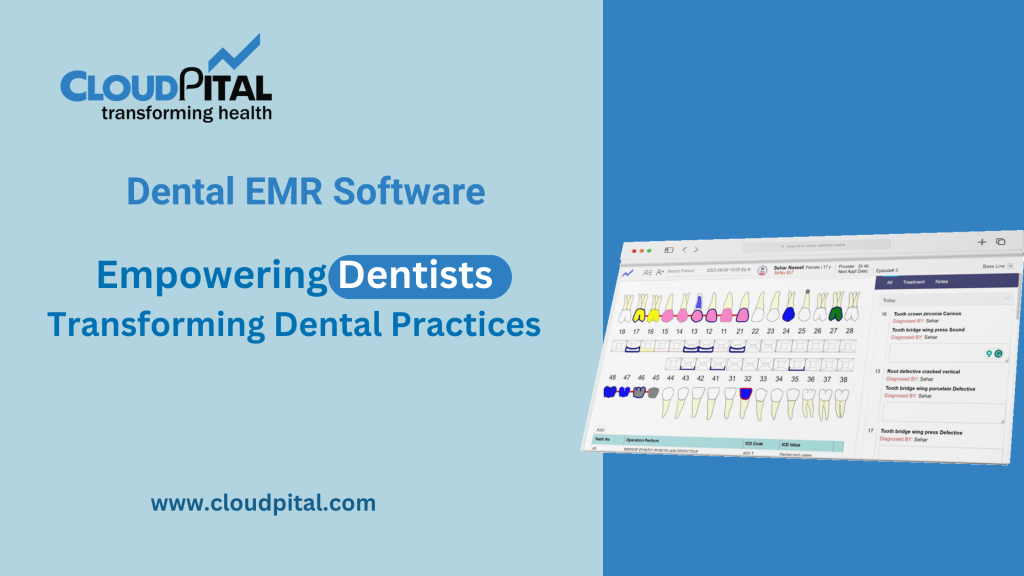Cloudpital # 1 is one of the top EHR Systems in Saudi Arabia have already revolutionized healthcare by digitizing patient records and improving the overall efficiency of healthcare facilities. In Saudi Arabia, the integration of EHR systems aligns with the country’s Vision 2030, which aims to modernize and digitize all key sectors, including healthcare. However, the healthcare landscape is evolving even further with the rise of Artificial Intelligence (AI). When combined with EHR systems, AI has the potential to reshape how healthcare is delivered, making it more personalized, efficient, and proactive.
In this blog, we will explore how EHR systems are being transformed by AI, the impact on Saudi Arabian healthcare, and the benefits and challenges of this emerging synergy.
Click to Start Whatsapp Chatbot with Sales
Mobile: +966502737333
Email: sales@cloudpital.com
Cloudpital # 1 EHR Systems in Saudi Arabia

The Rise of EHR Systems in Saudi Arabia
The introduction of EHR Systems in Saudi Arabia is part of a broader strategy to digitize healthcare services and improve patient care. Traditionally, healthcare facilities relied on paper-based records, which were inefficient and prone to errors. EHR systems have streamlined this process, enabling healthcare providers to store, retrieve, and manage patient records digitally.
EHR adoption in Saudi Arabia has been significantly influenced by the Ministry of Health’s initiatives to improve the healthcare sector’s efficiency, transparency, and quality. These systems offer numerous benefits, such as better patient data management, reduced errors, and seamless data sharing across healthcare facilities. Yet, the full potential of EHR systems is unlocked when they are combined with AI.
How AI Enhances EHR Systems
AI is transforming healthcare by analyzing massive amounts of data, identifying patterns, and offering predictive insights. When integrated with EHR systems, AI takes healthcare management to a new level by enabling more personalized patient care, predictive analysis, and data-driven decision-making.
Improved Diagnosis and Treatment Planning
One of the key benefits of integrating AI with EHR systems is the ability to provide healthcare professionals with more accurate diagnostic and treatment recommendations. AI algorithms can analyze a patient’s entire medical history stored in the EHR, identifying trends that may not be immediately obvious to a human doctor.
For instance, AI can flag early warning signs of chronic diseases like diabetes or cardiovascular issues based on patterns in lab results, past diagnoses, and other health indicators. This can help healthcare professionals in Saudi Arabia move toward proactive care, allowing them to intervene early and provide personalized treatment plans for patients.
Predictive Analytics for Better Outcomes
AI-powered predictive analytics can significantly enhance the capabilities of EHR systems. By analyzing historical data and medical trends, AI can predict outcomes such as potential disease outbreaks, the likelihood of a patient’s condition worsening, or the impact of certain treatments.
For example, AI tools can analyze EHR data to identify patients at high risk of developing complications after surgery. This information can help doctors in Saudi Arabia make more informed decisions and allocate resources more effectively, improving patient outcomes and reducing healthcare costs.
Natural Language Processing (NLP) for Data Extraction
AI-powered Natural Language Processing (NLP) enables the extraction of valuable insights from unstructured data within EHRs, such as doctor’s notes, discharge summaries, and patient feedback. NLP can process large volumes of textual information, identifying patterns and generating summaries that assist healthcare providers in making quicker and more informed decisions.
For instance, an NLP-based tool integrated with an EHR Systems in Saudi Arabia can quickly scan through patient histories and flag important findings, such as undiagnosed conditions or missed medications. This can reduce the cognitive load on physicians, who otherwise need to manually sift through extensive records.

AI-Driven Personalized Care in Saudi Arabia
Personalized medicine—tailoring healthcare based on individual patient data—is one of the major benefits of integrating AI with PMS. AI can analyze vast amounts of patient-specific data from EHRs, including genetics, lifestyle, and medical history, to offer personalized treatment plans.
Personalized Treatment Based on Genomic Data
In Saudi Arabia, where the population faces unique health challenges, such as a high prevalence of genetic disorders due to consanguinity, AI can be particularly effective. EHR systems integrated with genomic data and AI tools can help doctors personalize treatments based on a patient’s genetic makeup. For instance, AI could help identify the best medication for a patient based on their genetic predisposition to certain diseases or how they might react to specific treatments.
Optimizing Patient Care Pathways
AI can also improve patient care pathways by customizing healthcare journeys. By analyzing EHR data, AI tools can recommend the most effective treatment options for each individual patient based on previous treatment outcomes and patient demographics. This level of personalization ensures that patients receive the most suitable treatment from the start, reducing trial and error, minimizing adverse drug reactions, and improving overall satisfaction with healthcare services.
AI-Powered EHR Systems and Population Health Management
Managing population health is a major focus of Saudi Arabia’s healthcare transformation, especially given the high prevalence of lifestyle-related diseases such as obesity and diabetes. AI-powered EHR systems can play a crucial role in monitoring, analyzing, and predicting population health trends, thereby enabling proactive interventions.
Monitoring and Managing Chronic Diseases
By analyzing large datasets from EHR systems, AI can help identify population-wide trends and risk factors, allowing healthcare organizations in Saudi Arabia to develop targeted interventions. For example, AI can help track the progression of chronic diseases like diabetes across different regions, identifying which populations are most at risk and what preventive measures are most effective.
Public Health Surveillance
AI-powered EHR systems can also assist in public health surveillance by detecting early signs of disease outbreaks. AI algorithms can analyze patient data from EHRs to identify unusual patterns, such as spikes in respiratory infections or unusual symptoms in a specific area, allowing public health authorities to respond more quickly to potential outbreaks. This could be invaluable in Saudi Arabia, where the management of public health is a priority given the influx of pilgrims during events like Hajj.
The Role of AI in Improving Healthcare Operations
Beyond patient care, AI integrated into EHR systems can help Saudi Arabian healthcare facilities optimize their operations, reducing administrative burdens and improving efficiency.
Streamlining Administrative Tasks
AI can automate several time-consuming administrative tasks within EHR systems, such as data entry, billing, and scheduling. This not only saves time for healthcare staff but also reduces the risk of human errors, leading to more accurate data management and improved operational efficiency.
For example, AI can automate the process of coding medical procedures for billing purposes by analyzing the data entered in the EHR. This ensures that healthcare providers in Saudi Arabia can process payments more quickly and reduce revenue leakage.
Optimizing Resource Allocation
AI-powered EHR systems can also help healthcare facilities optimize resource allocation. By analyzing data on patient flow, appointment schedules, and staffing, AI can predict demand for healthcare services and recommend staffing adjustments accordingly. This is especially valuable in a country like Saudi Arabia, where healthcare demand can fluctuate significantly due to seasonal factors, such as the annual Hajj pilgrimage.
Challenges in AI-EHR Integration
While AI has the potential to transform EHR systems in Saudi Arabia, several challenges need to be addressed to ensure its successful implementation.
Data Privacy and Security
One of the biggest challenges in integrating AI with EHR systems is ensuring data privacy and security. EHR systems store sensitive patient information, and any breach of this data could have serious consequences. AI tools that access and analyze this data must adhere to stringent privacy regulations, such as Saudi Arabia’s Health Information Privacy and Confidentiality Law.
Ensuring that AI systems are secure from cyberattacks and unauthorized access is essential to protect patient data and maintain trust in the healthcare system.
Interoperability Issues
Interoperability is another major challenge when integrating AI with EHR systems. For AI to analyze data effectively, it must be able to access data from various healthcare providers and EHR platforms. However, many EHR systems in Saudi Arabia may not be fully interoperable, limiting the ability of AI tools to analyze and share data across different healthcare facilities.
To overcome this challenge, Saudi healthcare authorities must work toward establishing national standards for data sharing and interoperability, ensuring that AI tools can work seamlessly with different EHR systems.
The Future of AI-Driven EHR Systems in Saudi Arabia
As Saudi Arabia continues its journey toward healthcare digitization under Vision 2030, the integration of AI with EHR systems will play an increasingly important role. AI-powered EHR systems have the potential to improve patient care, streamline healthcare operations, and support the Kingdom’s goal of becoming a global leader in healthcare innovation.
The Potential for Remote Monitoring and Telemedicine
AI-driven EHR systems can also play a significant role in the growing fields of remote monitoring and telemedicine, which are becoming increasingly important in Saudi Arabia’s healthcare landscape. AI tools can analyze data from wearable devices, home monitoring systems, and telemedicine consultations, providing healthcare providers with real-time insights into a patient’s condition and enabling remote interventions.
Collaboration Between Healthcare and Tech Sectors
To fully realize the potential of AI-powered Medical Solutions in Saudi Arabia, collaboration between healthcare providers, government agencies, and technology companies will be essential. By fostering partnerships and investing in AI research and development, Saudi Arabia can continue to lead the way in healthcare innovation and improve the quality of care for its population.
Conclusion
EHR systems, when integrated with AI, have the power to transform healthcare in Saudi Arabia by enhancing patient care, streamlining operations, and improving public health management. While challenges such as data privacy and interoperability remain, the benefits of AI-driven EHR systems are undeniable. As Saudi Arabia continues to prioritize healthcare digitization under Vision 2030, the role of AI in healthcare will only grow, offering new opportunities for innovation and better health outcomes for all.
Click to Start Whatsapp Chatbot with Sales
Mobile: +966502737333
Email: sales@cloudpital.com
EHR Systems in Saudi Arabia
EHR Systems in Saudi Arabia
EHR Systems in Saudi Arabia
EHR Systems in Saudi Arabia and the Role of AI in Transforming similar software solutions prices were updated on 2026-02-09T05:32:00+00:00 in Saudi Arabia in Mecca, Medina, Riyadh, Khamis Mushait, Yanbu, Jeddah, Dammam, Unaizah, Uqair, Ha’il, Ta if, Al Bahah, Dhahran, King Abdullah Economic City, Najran, Diriyah, Qatif, Khafji, Jubail, Abqaiq, List of Cities and Towns in Saudi Arabia, Ras Tanura, Turubah, Jazan Economic City, Knowledge Economic City, Medina, Khobar, Abha, Tabuk, Saudi Arabia, similar software solutions prices were updated on 2026-02-09T05:32:00+00:00 We also provide in Saudi Arabia services solutions company in Hafar Al-Batin, Udhailiyah, Al-Awamiyah, Hofuf, Hautat Sudair, Buraidah, Tayma, Duba, ‘uyayna, Saihat, Al-Kharj, Al-ula, Jizan, Rumailah, Ar Rass, Arar, Shaybah, Al Majma’ah, Rabigh, Dhurma, Haradh, List of Saudi Cities by Gdp Per Capita, Badr, Sudair Industrial City, Baljurashi, Shaqraa, Al-Khutt, Habala, Ad Dawadimi, Dawadmi, Layla, similar software solutions prices were updated on 2026-02-09T05:32:00+00:00 Price is SAR 100 and this was updated on updated on 2026-02-09T05:32:00+00:00 similar EHR Systems in Saudi Arabia and the Role of AI in Transforming software solutions prices were updated on 2026-02-09T05:32:00+00:00 in Saudi Arabia in Haql, Afif, Al-Abwa, Farasan, Al-Jaroudiya, Thadig, Al-Thuqbah, Al Wajh, Almardmah, Al-Zilfi, Muzahmiyya, Prince Abdul Aziz Bin Mousaed Economic City, Tharmada’a, Skaka, Um Al-Sahek, Sharurah, Tanomah, Bisha, Dahaban, Al Qunfudhah, Qurayyat, Saudi Arabia, Ha’ir, as Sulayyil, Al Lith, Turaif, Al-Gway’iyyah, Samtah, Wadi Ad-Dawasir, Az Zaimah, Safwa City, Jalajil, Harmah, Mastoorah, Hotat Bani Tamim, Jabal Umm Al Ru’us, Rafha, Qaisumah, Al-Ghat, Hajrah, Al-Hareeq. Excerpt: Jeddah (also spelled Jiddah, Jidda, or Jedda; Arabic: Jidda) is a Saudi Arabian city located on the coast of the Red Sea and is the major urban center of western Saudi Arabia similar software solutions prices were updated on 2026-02-09T05:32:00+00:00 Price is SAR 100 and this was updated on updated on 2026-02-09T05:32:00+00:00
10-9-2024



